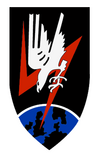Night Fighter Squadron 1
|
Night Fighter Squadron 1 |
|
|---|---|
|
The uniform squadron coat of arms of all night fighter squadrons. It shows an eagle plunging down from the night sky with red lightning on England. |
|
| active | June 26, 1940 to May 8, 1945 |
| Country |
|
| Armed forces | Wehrmacht |
| Armed forces | air force |
| Branch of service | Air force |
| Type | Jagdgeschwader |
| structure | Squadron staff and 4 groups |
| Aircraft type | Bf 109 D, Bf 110 , Do 215 , He 219 |
| Squadron commodors | |
| First commodore |
Colonel |
| Last commodore |
Lieutenant colonel |
The Nachtjagdgeschwader 1 was a squadron of the Luftwaffe in World War II , which was primarily set up and used for night hunting .
history
List and reclassifications
According to its numbering, the Nachtjagdgeschwader 1 was the Air Force's first night fighter squadron . The line-up took place on June 26, 1940 with the staff and groups I to III. The I. group was created by renaming the I. group of the destroyer squadron 1. The II. Group was completely reorganized. The III. Group of the squadron was created by renaming the IV. Group of Jagdgeschwader 2 . The staff was initially in Arnhem , later Deelen , the groups were set up in Mönchengladbach , Schiphol and Düsseldorf . The squadron was initially equipped with Messerschmitt Bf 110 machines. In the summer of 1940, NJG 1 had to surrender its II. Group for the establishment of Night Fighter Squadron 2 . In return, the NJG 1 was replaced by the I. Group of Destroyer Squadron 76. In the winter of 1942/1943 the squadron was reinforced by the creation of a IV. Group, which emerged from NJG 2 by renaming the II. Group. The wing recognition was G9.
commitment
From 1940 to 1944, the squadron was responsible for air defense in the Netherlands and on the Lower Rhine . The squadron was subordinate to Luftflotte 2 , later the 1st Fighter Division and the 3rd Fighter Division. The squadron had been involved in the Cerberus operation in February 1942 . The longest-used airfields of the four groups until 1944 were Venlo , St. Trond , Rheine and Leeuwarden . At the end of 1944, the entire squadron was relocated to Germany for the Reich air defense. In the spring of 1945 the I. Group was on Westerland . The II. Group in Völkenrode . The III. Group, however, was initially in Störmede , later in Neumünster . On March 30, 1945, the squadron was reduced to the staff and only four squadrons (1, 4, 7 and 10). In his publication, Dierich speaks of a reduction to an extended independent season per group.
Last outline
The last structure of the NJG 1 dates from the beginning of May 1945. However, Werner Girbig's publication only gives the surnames of the group commanders. This results in the following structure:
| group | Rank | Surname | Aircraft type |
|---|---|---|---|
| I. group | Captain | Baake | Heinkel He 219 |
| II group | Captain | Breves | Messerschmitt Bf 110 |
| III. group | major | Drewes | Messerschmitt Bf 110 |
| IV. Group | Captain | Greiner | Messerschmitt Bf 110 |
Squadron commodors
Between 1940 and 1945 the squadron was led by three Commodores :
| Rank | Surname | date |
|---|---|---|
| Colonel | Wolfgang Falck | June 26, 1940 to June 30, 1943 |
| Colonel | Werner Streib | July 1, 1943 to February 28, 1944 |
| Lieutenant colonel | Hans-Joachim Jabs | March 1944 until the end of the war |
Group commanders
I. group
- Captain Günther Radusch, July 1, 1940
- Major Werner Streib , October 18, 1940
- Captain Hans-Dieter Frank, July 1, 1943
- Captain Manfred Meurer, September 28, 1943
- Major Paul Förster, January 1944
- Captain Werner Baake, October 2, 1944
II group
- Captain Conrad von Bothmer, June 22, 1940
- Captain Karl-Heinrich Heyse, July 1, 1940
- Captain Count von Stillfried, September 7, 1940
- Major Walter Ehle, October 6, 1940
- Major Eckart-Wilhelm von Bonin, November 18, 1943
- Captain Adolf Breves, October 26, 1944
III. group
- Captain Conrad von Bothmer, July 1, 1940
- First Lieutenant Schön, November 1, 1940
- Major von Graeve, February 8, 1941
- Captain Wolfgang Thimmig, June 6, 1942
- Major Egmont Prinz zur Lippe-Weißenfeld , June 1, 1943
- Major Martin Drewes , March 1, 1944
IV. Group
- Major Helmut Lent , October 1, 1942
- Captain Hans-Joachim Jabs , August 1, 1943
- Major Heinz-Wolfgang Schnaufer , March 1, 1944
- Captain Hermann Greiner, November 1, 1944
Known squadron members
- Walter Scheel (1919–2016), politician of the FDP and the fourth Federal President of the Federal Republic of Germany
- Werner Streib (1911–1986), was in 1966 as brigadier general "Stage Manager Flying Associations" in the Bundeswehr Air Force
literature
- Georg Tessin : Associations and troops of the German Wehrmacht and Waffen SS in World War II 1939–1945. Volume 14, Flying Associations, Biblio-Verlag 1998, ISBN 978-3764811112
- Wolfgang Dierich: The air force associations 1935-1945. Structure and short chronicles - a documentation. Motorbuch-Verlag Stuttgart 1976
- Dieter E. Kilian: Politics and the military in Germany: The Federal Presidents and Federal Chancellors and their relationship to the military and the Bundeswehr. Miles-Verlag 2011, ISBN 978-3937885360 Outline google.books
- Ernst Obermaier: The Luftwaffe Knight's Cross bearers 1939–1945. Volume I, fighter pilot, Verlag Dieter Hoffmann, Mainz 1966

